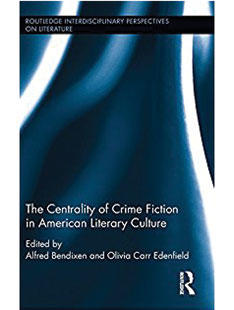Crime fiction dominates bestseller lists, but many don’t consider it a significant literary form. Yet many crime novels explore issues of race, class, and gender in provocative ways that are worthy of examination, says English department lecturer Alfred Bendixen: “Crime fiction is not marginal. It’s central to American culture and American identity.”

Many of the classics of American literature should be considered crime fiction, according to Bendixen, who is co-editor of The Centrality of Crime Fiction in American Literary Culture (Routledge), a collection of academic essays presenting the genre as not solely the property of Dashiell Hammett and Raymond Chandler. It cites Mark Twain, William Faulkner, and Richard Wright, among others, as masters of the genre.
Bendixen calls Nathaniel Hawthorne’s The Scarlet Letter the first major American crime novel. Adulterer Hester Prynne is considered a criminal and punished with imprisonment. Author Flannery O’Connor frequently made use of flashes of criminal violence in her work, such as the murders in her short story “A Good Man is Hard to Find.” “She believed you needed moments of extreme violence so that our social façade would fall away,” he says.
Book reviewers considered F. Scott Fitzgerald 1917’s The Great Gatsby a crime novel when it came out in 1925. Its commentary about class in American society is intertwined with the criminal pursuits of its characters, Bendixen points out. Gatsby steals bonds — a metaphor for his interest in getting Daisy to break her matrimonial vows with him — while the wealthy Buchanans commit crimes in a way that befits their social status. Gatsby’s partner rigs the championship of the most American of sports when he fixes the World Series.
Criminal acts in fiction are often employed to lay bare our nation’s complicated relationship with race, according to Bendixen. Wright’s Native Son explores the ramifications of a black man murdering a white woman. When the protagonist of Adventures of Huckleberry Finn helps Jim run away from slavery, Huck recognizes that he is breaking the law, and author Mark Twain uses this violation to demonstrate the moral turpitude of slavery, Bendixen says. “Twain is asking: If saving Jim is a criminal act, what does that say about American values?”
Walter Mosley, one of the premier crime writers working today, uses detective fiction as a vehicle to shed light on the dynamics of racism and economic injustice. Mosley’s Easy Rawlins series offers a wide-ranging historical vision of African American life in Los Angeles, Bendixen says.
Bendixen hopes readers will give some thought to the importance of the work of some of their favorite crime writers. “In addition to reading these books for fun,” he says, “we should think about the important questions they raise about society and American values.”












1 Response
Norman Ravitch *62
7 Years AgoWhat About Crime Fiction Elsewhere?
Has crime fiction been less important in other major countries? The Germans and Russians surely have been keen on crime fiction. Just think of Dostoyevsky's Crime and Punishment and The Brothers Karamazov. And what about the writers in the Kaiserreich and in the Weimar Republic, not to mention the period after WWII?